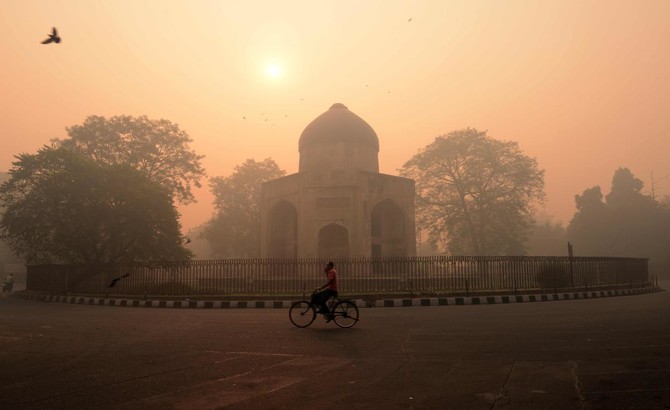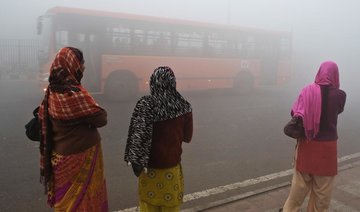NEW DELHI: India’s environmental watchdog shut down a coal-fired power plant and banned the use of diesel generators in New Delhi as air quality plummeted in the world’s most polluted capital on Wednesday, the start of the Diwali festival.
New Delhi experiences suffocating smog every year around Diwali, when farmers in north India burn the stubble left behind after the harvest and revelers let off smoke-spewing firecrackers.
The onset of winter aggravates the problem as the cooler air traps the pollutants, a phenomenon known as inversion.
The Environment Pollution (Prevention and Control) Board, a statutory body, made the ruling as levels of PM2.5 pollutants in the air reached around 200 micrograms per cubic meter — eight times the World Health Organization safe limit of 25.
“Difficult situations demand tough responses and solutions and Delhi is faced with a really difficult situation each winter when air pollution levels spiral out of control,” said its chairman Bhure Lal in a statement.
The Board said the city’s Badarpur power plant, which has a capacity of around 700 megawatts, would be closed until March. The plant is due to shut down for good next July as India seeks to move away from heavily-polluting fossil fuels.
It also banned the use of the privately-owned diesel generators that many rich households rely on during India’s frequent power cuts.
The measures follow a temporary ban on the sale of firecrackers in Delhi introduced earlier this month by the Supreme Court to ease the pollution levels.
Last year, levels of PM2.5 — the fine particles linked to higher rates of chronic bronchitis, lung cancer and heart disease — soared to 778 in the days that followed Diwali, prompting the Supreme Court to warn of a public health emergency.
Levels of PM2.5 between 301 and 500 are classified as “hazardous,” while anything over 500 is beyond the official index.
The Delhi government then shut schools for three days, banned all construction work for five days to curb dust levels and temporarily closed the Badarpur plant.
A 2014 World Health Organization survey of more than 1,600 cities ranked Delhi as the most polluted.
India’s notoriously poor air quality causes over a million premature deaths every year, according to a joint report by two US-based health research institutes earlier this year.


New Delhi shuts power plant in fight against Diwali smog
New Delhi shuts power plant in fight against Diwali smog

Kyrgyzstan parliament speaker resigns after spy chief sacking

BISHKEK: Kyrgyzstan’s parliament speaker said Thursday he would step down, two days after President Sadyr Japarov dismissed the Central Asian country’s powerful secret service chief and arrested political figures who called for early elections.
In a surprise move, Japarov had sacked his one-time close ally — spy chief Kamchybek Tashiev — in a decision Bishkek said was meant to “prevent division in society.”
Japarov is seeking re-election next year in a country that was once a regional leader in terms of openness, though marked by political volatility.
Rights groups have accused him of authoritarian tendencies, as he seeks to assert his control and cast himself as a bringer of stability.
Speaker Nurlanbek Turgunbek uulu — close to the sacked security boss — told MPs he would step down, insisting that he was not resigning under pressure.
“Reforms initiated by the president must be carried out. Political stability is indispensable,” he said.
Kyrgyzstan has in recent years been de-facto governed by the Japarov-Tashiev tandem.
Both came to power in the wake of the 2020 revolution — the third since Bishkek gained independence from the Soviet Union in 1991.
Several NGOs have in recent months denounced the deterioration of freedom of expression in Kyrgyzstan.
Japarov had unexpectedly sacked Tashiev and three of his deputies on Tuesday, also weakening the powers of the secret services.
Japarov rarely speaks publicly. His spokesman had said the decision was taken “in the interests of the state, with the aim of preventing divisions within society, including between government structures, and to strengthen unity.”
Tashiev was in Germany for health treatment when the sacking was announced and had said it was a “total surprise” to him.
The decision came the day after the publication of an open letter from 75 political figures and ex-officials calling to bring forward presidential elections — scheduled for January 2027.
Five of those who signed the letter — which criticized the economic situation in the country — were arrested Wednesday on charges of organizing mass riots.
In a surprise move, Japarov had sacked his one-time close ally — spy chief Kamchybek Tashiev — in a decision Bishkek said was meant to “prevent division in society.”
Japarov is seeking re-election next year in a country that was once a regional leader in terms of openness, though marked by political volatility.
Rights groups have accused him of authoritarian tendencies, as he seeks to assert his control and cast himself as a bringer of stability.
Speaker Nurlanbek Turgunbek uulu — close to the sacked security boss — told MPs he would step down, insisting that he was not resigning under pressure.
“Reforms initiated by the president must be carried out. Political stability is indispensable,” he said.
Kyrgyzstan has in recent years been de-facto governed by the Japarov-Tashiev tandem.
Both came to power in the wake of the 2020 revolution — the third since Bishkek gained independence from the Soviet Union in 1991.
Several NGOs have in recent months denounced the deterioration of freedom of expression in Kyrgyzstan.
Japarov had unexpectedly sacked Tashiev and three of his deputies on Tuesday, also weakening the powers of the secret services.
Japarov rarely speaks publicly. His spokesman had said the decision was taken “in the interests of the state, with the aim of preventing divisions within society, including between government structures, and to strengthen unity.”
Tashiev was in Germany for health treatment when the sacking was announced and had said it was a “total surprise” to him.
The decision came the day after the publication of an open letter from 75 political figures and ex-officials calling to bring forward presidential elections — scheduled for January 2027.
Five of those who signed the letter — which criticized the economic situation in the country — were arrested Wednesday on charges of organizing mass riots.
© 2026 SAUDI RESEARCH & PUBLISHING COMPANY, All Rights Reserved And subject to Terms of Use Agreement.












